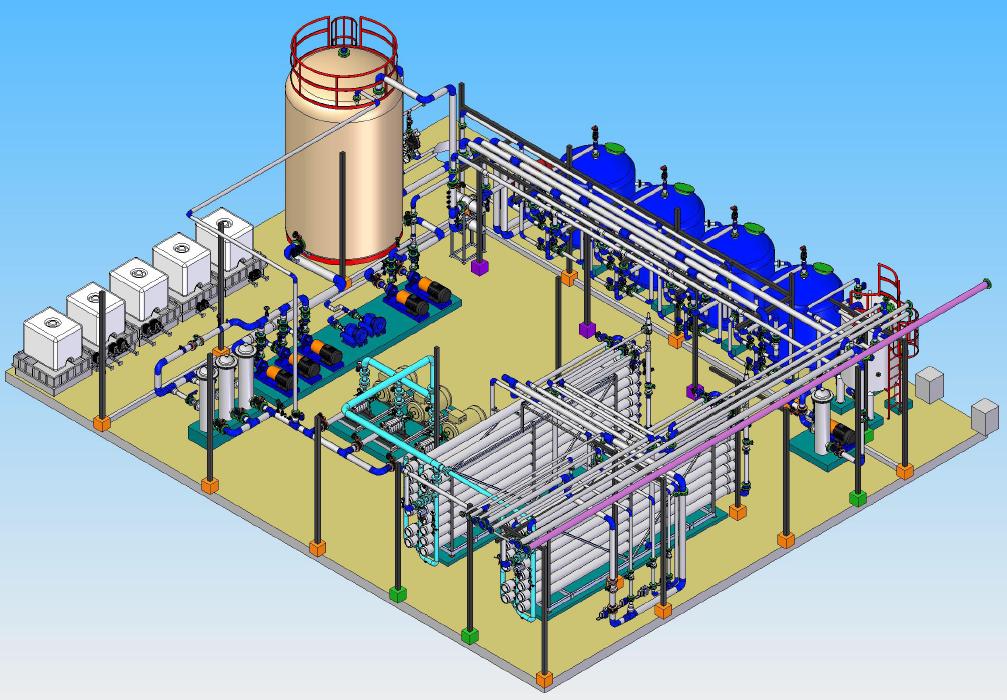The new facility, although the cost of its construction is about four million dollars, has already saved the factory about 12 million dollars because it allows the disposal of materials left over from production and a new use of water in the process

At the Makhteshim factory in Ramat Hovav, a unique desalination facility of its kind in the world is currently being established with an investment of about four million dollars. At the end of the process, the facility turns industrial wastewater into purified water that is returned to full industrial use in the factory's production facilities.
The unique desalination facility was revealed for the first time as part of a seminar hosted by the Ramat Hovav Council on innovations and improvements in the field of environmental quality at the Ramat Hovav Council's factories. The purpose of the seminar, as explained by the head of the council Andrey Ozan, is to share with the representatives of the factories mutual information about improvements and new research in the field of environmental quality, a field that occupies all the factories of the council in which they invest tens of millions of dollars every year.
For example, Gadi Dahan, the manager of the administration and business unit of bromine compounds in Ramat Hovav, presented the great savings achieved in the factory through the separation of metal, plastic waste and the recycling of paper and wood within the factory.
The climax of the symposium was the lecture by Reuven Cohen-Zidon (Konzi), the chief technologist of the Makhteshim plant, and the project manager of the company, Avi Rushnik, who revealed for the first time the desalination plant using the reverse osmosis method currently being installed at the plant.
Although the desalination of waste water by this method is not an exciting technological innovation, the achievements reached by Makhteshim engineers in purifying and treating industrial waste water to such a high level that it deserves to be returned to any industrial use - are unprecedented in the world. The new facility, although the cost of its construction is about four million dollars, has already saved the plant about 12 million dollars, because due to the high quality of the purified water, the plant will be able to reuse about 1500 cubic meters of water per day (out of about 2500 cubic meters of daily consumption) and transfer industrial effluents to the evaporation ponds to an extent significantly less than planned. This will save the construction of two new evaporation ponds out of five new ponds designed in the factory and this means a saving of about 12 million dollars.
The researchers of the German company "Bayer" who were in contact with the researchers of "Makhteshim" did not believe the results of their colleagues from Israel and claimed that the numbers did not make sense, until they realized that they were possible when they reached Ramat Hovav.
These days, the desalination plant is being established within the boundaries of the Makhteshim factory in Ramat Hovav. Its operation will begin in July of this year and it is expected that 90 percent of the water that will be treated will return to industrial reuse and reduce the amount of water purchased from sources. The remaining 10 percent will be used for irrigation with the approval of the Ministry of Health.
Ramat Hovav Council CEO Yossi Ziv, who chaired the symposium, said that until a few years ago desalination of industrial wastewater was considered a pipe dream. "We are witnessing something that is no less than a miracle. It's not just about the aspect of saving water and resources, but the meaning of reducing the use of evaporation ponds."
The above materials are taken from a press release of the Makhteshim company

5 תגובות
So who said no miracles happen?
Mining engineer:
Too many professional TLAs. We are not all engineers in craters. If you want us to also understand you, and not just be impressed by how professional you are in your field, you should also interpret the abbreviations, or not write them in the first place.
The green vision is coming true - it's cheaper to recycle than to pollute.
In addition to the desalination facility, the LOPROX facility is being erected (in the final stages) which decomposes (oxidizes) the AOX waste water that does not decompose biologically in a unique method.
In addition, the aforementioned technology is a synergy between the knowledge of Bayer and Maktishim and the facility is the flagship facility of BTS.
If the Germans are shocked, it's probably really something special. We need to implement it in Israel and export this knowledge to the world.